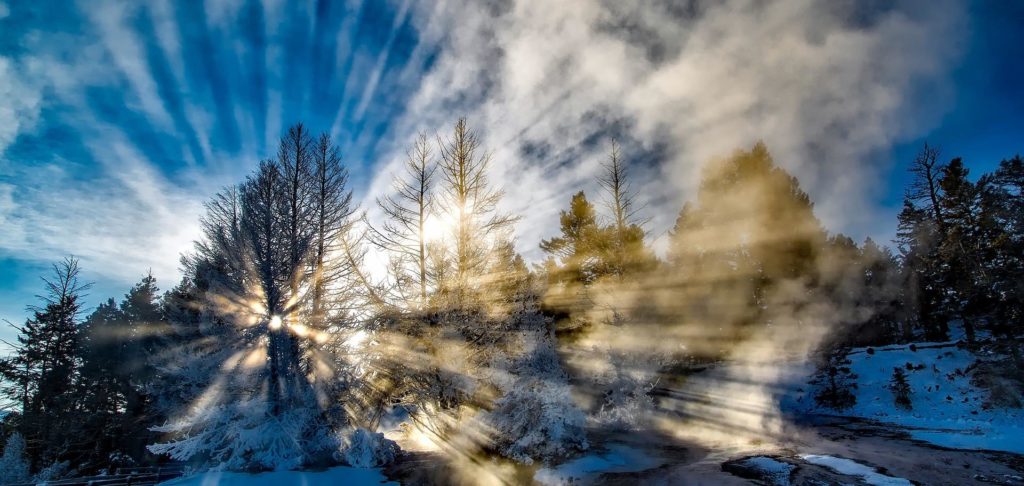She always is but isn’t you know.” In Blanton County people used that saying every now and again, never paying any mind to wonder where it came from. That saying was a hand-me-down from years gone by, just like the things mom packaged me in before she sent me off to school.
Faded jeans with patches stitched over holes in the knees. Corduroy trousers for picture day I told her didn’t fit, they were too big, but mom insisted, “You’ll grow into them in time.” Mom was always saying things like that.

“She always is but isn’t you know.” Hand-me-down words patiently waiting for their resurrection from a tomb of the colloquial. They had a meaning, a real one, that would be restored when they were spoken just right. But by our nature, these days we are wont to take words like those and emphasize the parts we care about—the “is” and the “isn’t”—because these days being is what defines our lives.
And so do the things we put on every morning, the things I dressed in each morning, things my older cousins had outgrown. Button-up shirts with long sleeves and collared short-sleeves with stripes and alligators where there weren’t any on shirts other kids wore.
Mom soothed, “Other kids will never know,” but she never could bring herself to say the rest, that they were my cousins’ old clothes. She always tried to lift my spirits before I headed down gravel to catch the bus.
Other kids knew, from the moment I hauled myself on board and settled into the first empty vinyl bench-seat I could find, I could tell they did. It was in the way they pretended not to see me and then eyed me in middle school hallways, or said things that lacked my name but still packed a potent sting. Other kids knew. I could feel it as I lived, wrapped up tight in hand-me-downs cousins had long outgrown.
I waited for the school bus by a row of mailboxes set in a wood frame where our gravel road met asphalt that led to town, and across from a snake of railroad tracks that mirrored August back dull. Asphalt took me to places where I was the outcast, the poor kid from back in the hollows with different hair, shoes dusted the color of gravel, swallowed up in hand-me-downs. I wished each day would be better, but deep down, knew it couldn’t be so.
A drifter, sauntering slow by the tracks, came into view. I reckoned the tracks were the way he escaped the places asphalt wanted to take him; freight cars must have been his temporary saviors granting quick getaways and momentary reprieves from his own version of living as the outcast.
The old drifter tried to steady his gait once he saw me. “She always is but isn’t you know. You heah me boy?” He lectured stern, hoarse, through the putrid stink of last night’s liquor, his face and hands leathery and deeply lined from a life lived hard. I imagined each line deep and, at its bottom, a collection of memories he couldn’t escape by hopping the next train.
“You heah me son?” the drifter hollered. He’d stopped walking and instead stood there, skin and bones, swaying uneasy. “Listen heah. She always is, but isn’t you know.”
I shook my head, confused.
He cackled at me, wagging his crooked finger, “You got to wake up at first light if’n you aim to find her. But you have to know how to look for her. You have to know you want to find her.”
“Find who?” I asked, standing there in hand-me-downs as the low school bus groan stole its way into our conversation from a ways down the road.
The old drifter wobbled as he turned his head to see how close the bus was, and then continued on along his way, never answering my question even though I called out to him over and over. Maybe it was wrong of me, the pupil, to question him, the teacher, even if that teacher would soon be crouched low in a freight car lumbering its way far from coal mines and clapboard.
I woke while the sky was still dark on a Thursday morning, dressed in faded jeans and flannel to ward off October’s chill, and stepped out into the backyard.
“She always is, but isn’t you know.” I didn’t get it right at first. I had to move emphasis and rest among the syllables, and change the ways my lips and tongue modulated each component that in sum formed the body of the mantra.
“She always is, but isn’t you know.” It wasn’t about “is” or “isn’t,” or being. It was about her and I, and knowing. What I knew that morning as the first hint of light colored the sky was that I needed her, and I understood what it felt like to need, living as me and mom did at the end of a gravel road.
She curled like a wisp of smoke when she grew up out of earth as dawn pulled up the dew into a low mist that smelled clean and made me wonder what heaven was like. As she rose in the air she clothed herself in the green of grass, gold and auburn that drifted down from autumn trees; the last wildflowers that bloomed before first frost ringed bracelets on her wrists and a crown for her head.
And the old drifter’s lecture made sense, if only for a moment: She is always there, but you have to know you want her to be. If you don’t? Then you’ll never see her right there before your very own eyes.
Angel? Fairy? Spirit? None of those things crossed my mind right then, because nothing much mattered except for her resplendent awakening, framed as it was in prisms of dawn that shone strident through the trees.
“She always is,” I whispered, my breath grey in the morning clear, as her form grew larger and reached higher, into a new day’s sky and beyond.
Inside white clapboard the sounds of mom beginning her day filtered into the air: she would do her level-best to get me off to school before she went over to the mine, hoping for overtime if they’d give it to her and the claxon that would declare resurrection from the din of machinery when her day’s work there was through. That was mom, doing what she always did, every day of her life I could remember.
I watched the last wisp of her drift up into pale sky and then headed toward the back door. “She always is.” There would be a hand-me-down pair of pants and shirt waiting for me—another hand-me-down day was beginning—but for once I wasn’t swallowed up, a captive of its mores.
No. I was bigger than that, reaching higher, you know?
This story previously appeared in Penumbric Speculative Fiction, Feb 2022.
Edited by Marie Ginga
Andrew writes science-fiction and fantasy from the state of Maryland, often drawing ideas from jogs through forest trails at sunrise. His work has previously appeared in AntipodeanSF, 365 Tomorrows, Daily Science Fiction, Penumbric Speculative Fiction, and in MetaStellar as reprints and MetaStellar Anthhology – his work has also short-listed in several writing contests. Andrew welcomes reader feedback at dominobeanbag@gmail.com.

